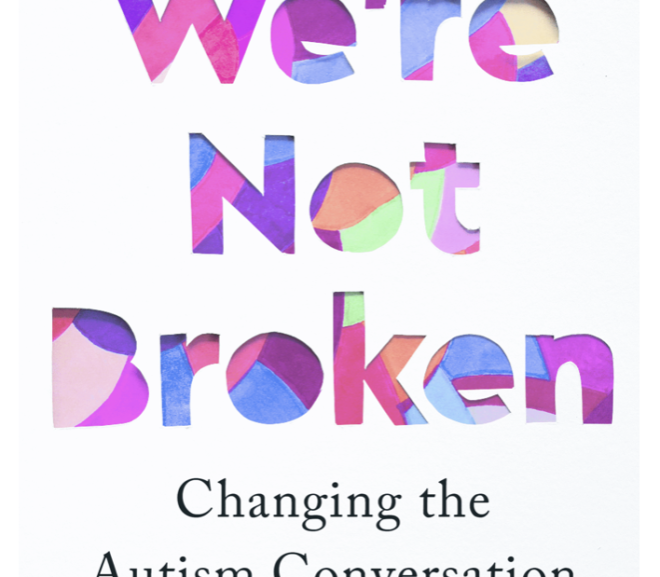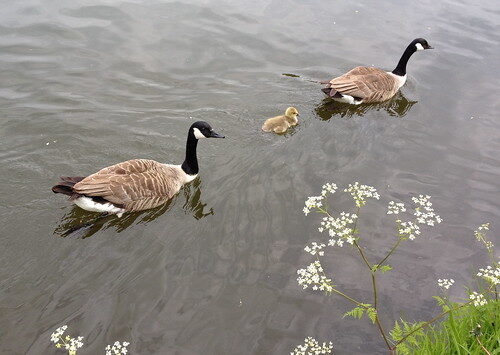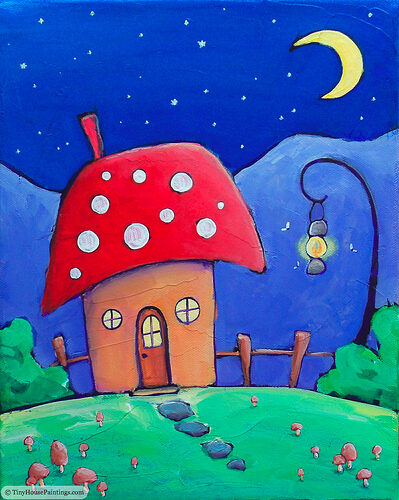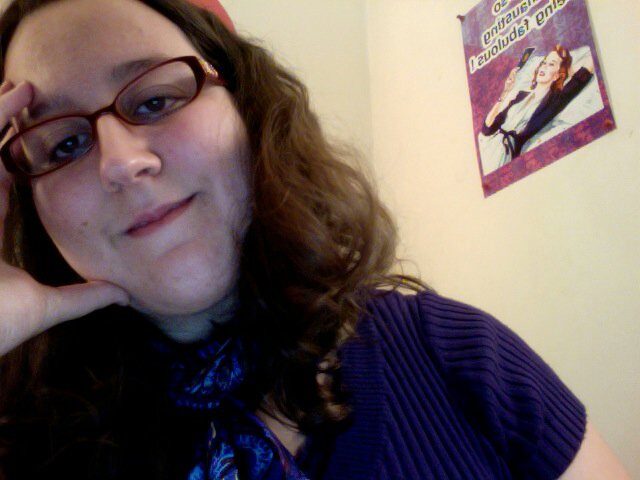“The way we diagnose kids overwhelmingly leads to Black and Latino kids getting diagnosed with behavioral disorders instead of autism. It also excludes a lot of women and femme people, to say nothing of transgender males and nonbinary people. We also ignore a lot of people for whom English is a second language.”
Tag: Julia Bascom
These revelations, about presuming competence, human dignity, and the least dangerous assumption—they don’t apply only to kids who are secret geniuses. They apply to everyone. They are the most important for the kids who really do have intellectual disabilities, who really can’t read or use full sentences and who really do need extensive support.
Painting © Tracy Booth | Creative Commons/Flickr [image: Painting of a tiny home with a red roof with white spots, and a lantern, under a crescent moon] Many of our U.S.-based community members, including parents and caregivers, want guidance and clarity about how the impending Home and Community Based Services (HCBS) Settings rule will affect both adult housing choices and adult day programs. So, we spoke with policy expert Julia Bascom, Executive Director of the Autistic Self Advocacy Network, who explained in plain conversational language how exactly the new HCBS Settings rules will affect housing options, how some common misunderstandings about the rule happen, and why the rule is essentially about trying to ensure adults with disabilities have the same basic rights as non-disabled adults do. Thinking Person’s Guide to Autism: Why was the rule enacted in the first place? Julia Bascom: The HCBS Settings Rule sets ground floor, baseline…
Photo © Gayan Gunawardana | Creative Commons [image: Backlit photo of a sad ponytailed person with their head down, in profile in front of an ocean sunset.] Dr. Sarah Cassidy co-chaired a SIG (Special Interest Group) on Autism and Suicidality at IMFAR 2016, in Baltimore. We weren’t able to attend her session, but Dr. Cassidy was kind enough to take time, later that same day, to talk with TPGA editors Shannon Rosa and Carol Greenburg, autistic autism researcher Dr. Steven Kapp, and Autistic Self Advocacy Network Executive Director Julia Bascom. The following is a transcript of our conversation. —- Shannon Rosa: Tell us about what you discussed in the SIG. What has your research revealed about suicidality in autistic people? Dr. Cassidy: We’ve published two studies so far. The first study we did, which is free to access in the new Lancet (Psychiatry) journal, was a medical chart review, a…
Shannon Des Roches Rosa with Carol Greenburg Your faithful TPGA editors spent most of last week in Baltimore, Maryland at IMFAR, the International Meeting for Autism Research. We gleaned as much as we could from the 2000 scientists, professionals, autistic people, and family members from all over the world who spent three full days talking about the most current findings and trends in autism research. But we didn’t cover everything or meet everyone we wanted to, because doing so is not physically possibly without a Time Turner. (If you ever want to experience abject FOMO — fear of missing out — by all means, go to IMFAR.) Overview Ninety-nine percent of the researchers at IMFAR are the nicest, most well-meaning scientists one could ever meet, which makes for a friendly atmosphere. We were happy to see significant progress on some research fronts: only a single presentation about vaccines, and it…
Shannon Des Roches Rosa www.thinkingautismguide.com Yesterday the U.S. Centers for Disease Control and Prevention (CDC) held a media briefing to announce and discuss readjusted estimates for autism prevalence: 1 in 68 children. But what does that estimate actually mean? Well, that takes some critical analysis, digging, and sifting, which we’ll walk you through, starting with the CDC’s Dr. Colleen Boyle’s opening statement: “CDC estimates that one in 68 children has been identified with autism. This estimate is based on information collected from health and special education records of children who are eight years old and living in 11 communities in Alabama, Arizona, Arkansas, Colorado, Georgia, Maryland, Missouri, New Jersey, north Carolina, Utah, and Wisconsin in 2010. These data are from CDC-sponsored autism and developmental disabilities monitoring network. The new estimate exceeds previous overall estimates, roughly it’s 30 percent higher than our last estimate of one in 88 children. To better…
And Straight On til Morning : Essays on Autism Acceptance edited by Julia Bascom Published by the Autistic Self-Advocacy Network We want April — Autism Acceptance Month — to matter, to help further acceptance and understanding of autistic experiences, happiness, and rights for autistic people of all ages and abilities. We will be publishing your Autism Acceptance posts and pictures all month long. If you want to participate, contact us at thinkingautism at gmail dot com. -TPGA Editors In keeping with Autism Acceptance month, there probably isn’t a more appropriate book to share than And Straight On til Morning : Essays on Autism Acceptance, which contains the work of wonderful Autistics and allies, including Zoe Gross, Shain Neumeier, Lydia Brown, as well as Kassiane Sibley, and Shannon Des Roches Rosa from TPGA. Julia Bascom edited the collection, and in its current format, an ebook, it is available quickly, and very…
Linda at Outrunning the Storm outrunningthestorm.wordpress.com My son, Charlie fell apart last fall when kindergarten started. So did I. It was one of the darkest times in my life. But, I can say today — and I don’t say this lightly — that I am so very glad for everything that happened last year. All of it. You see, last fall I felt like my child was broken. I knew I was broken and I had no idea what to do about any of it. Most days Charlie wasn’t fit to leave the house. I stopped talking to people. What could I say? I live in fear of my five year old child’s violence? I couldn’t. I didn’t. Instead I went to my blog. Under the guise of anonymity, I went to my blog and I wrote and I wrote and then I started reading. Everyday, I read every single…
Julia Bascom juststimming.wordpress.com Buckle up kids, because this gets long and personal. So, a long time (~seven months) ago, in a galaxy far, far away (rural New Hampshire) there lived a sad little girl (or KICKASS ADULT) named Julia who just so happened to have a friend named C. C and Julia had spent the past several months talking too much altogether about the TV series Glee, and C had begun to push for Julia to add a second show to her plate. Some brightly-colored sitcom about derelicts going to a community college. And Julia was skeptical, but C was persistent, for she knew that if Julia liked the first two minutes, Julia would have a new favorite show. See, C knew something that Julia did not. C knew that Abed Nadir existed. Now, there are a couple of things you, gentle reader, must know about Julia in order to…
We’re featuring “Slice of Life” conversations with Autistics of all ages — kids through adults — throughout April’s Autism Acceptance Month Our goal is to help TPGA readers understand that autistic people are people who have interesting, complicated lives and who are as diverse and varied as any other population united by a label. We are the people in each other’s neighborhoods, and the more we know about each other — the more visible autistic people and children are — the more common autism acceptance will be. That is our hope. Today we’re talking with Julia Bascom, a frequent contributor to Shift Journal and the powerhouse behind the Loud Hands Project. What is your name? My name is Julia Bascom. Do you have a website? juststimming.wordpress.com What would you like a one-sentence description of yourself to say? I am not a word/I am not a line/I am not a girl…







